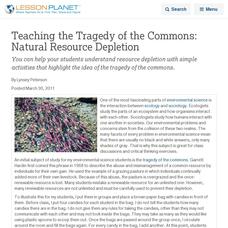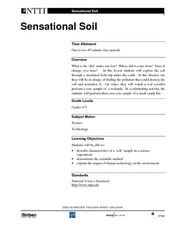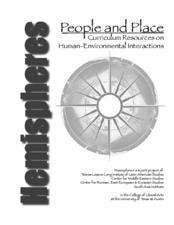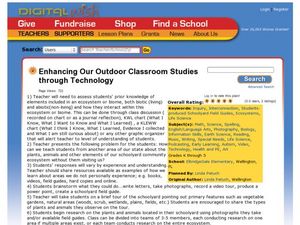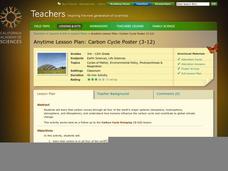Curated OER
Teaching the Tragedy of the Commons: Natural Resource Depletion
You can help your students understand resource depletion with simple activities that highlight the idea of the tragedy of the commons.
Curated OER
Nana by Emile Zola
In this literature learning exercise, students respond to 10 short answer and essay questions about Zola's Nana. Students may also link to an online interactive quiz on the novel at the bottom of the page.
Curated OER
The Handmaid's Tale Quiz
In this online interactive reading comprehension worksheet, students respond to 12 multiple choice questions about Margaret Atwood's The Handmaid's Tale. Students may submit their answers to be scored.
Curated OER
Environment As Art
Students create an idea for environmental artwork for installation somewhere on school property.
Curated OER
Human-Environment Interaction: Crete
In this Human Environment Interaction, students read a passage, then answer four questions with short responses. They also write an essay about volcanic eruption.
Curated OER
Problem Solving with Multi-Step Number Stories
Pupils solve multi-step number stories. They create number models to solve number stories. Everyone chooses the appropriate operation to use after reading the problem, and then work in small groups to...
Curated OER
Hate 2.0
Combat hate online by bringing it into the light. Begin by giving learners a quiz, then lead a discussion based on the issues the quiz brought up. As a class, develop strategies to confront online hate. Assign different venues to groups...
Discovery Education
Sonar & Echolocation
A well-designed, comprehensive, and attractive slide show supports direct instruction on how sonar and echolocation work. Contained within the slides are links to interactive websites and instructions for using apps on a mobile device to...
Curated OER
Hawaii's Sandy Shores
Investigate Hawaii's sandy shore ecosystem! Start by creating a vocabulary list and having your class complete a KWL chart. Next, pass out the "I think of" sheet. Each learner will then choose a word from a beach bucket and add it to...
Virginia Department of Education
Freshwater Food Chains
What's in the water? Encourage your class to further explore this question and learn about pond ecosystems, food chains, and food webs as they complete this hands-on activity. They view the environment from a new perspective...
Curated OER
Sensational Soil
Fourth and fifth graders explore soil by taking a simulated field trip under the earth. They go to an Internet site that runs a simulation which charges them with finding a source of pollution that could destroy all of Earth's soil, and...
Curated OER
Hemispheres: People and Place
Here is an astounding series of lessons, designed for high schoolers, on environmental policy. By studying water conservation in rural India, the role of the government, and the reaction of the people, learners begin to formulate...
Curated OER
Itaipu Dam and Power Plant (Brazil and Paraguay)
Learners study South America's Itaipu Dam and Power Plant in order to gain an understanding that hydroelectric power is a major means of generating electricity throughout the world. They also look into the environmental impacts that...
Curated OER
The Republic of Sakha (Yukutia)
Young geographers learn about the extreme temperatures found in the Rebublic of Sakha, and study the hardships caused by these temperatures. They look at why people choose to live in such a remote and rugged area. This incredible,...
Curated OER
Discovering Local Food Chains
Fourth graders study about food chains. With the assistance of a local biologist, Students hike the school trail system. They explore ecosystem and collect data by charting the organisms found and identifying the energy source. They...
Howard Hughes Medical Institute
Gorongosa: Making Observations Activity
Do you have young scientists wanting to make new discoveries rather than just completing the same experiments? Young scientists use their observational skills to identify animals and patterns in animal behavior. Through tracking...
Curated OER
The Beginning of the War -- Two Views on Texas
Young scholars discuss the factors that can lead to war, and the motivations of countries going into war. They research two viewpoints on Texas during the Mexican War and participate in a debate with their classmates.
Curated OER
Children's Books
A challenging lesson on writing a book for children awaits your fifth-graders. They must use laptops, document cameras, and a projector to create and present an original piece of writing. A checklist that has all of the requirements for...
Curated OER
Student News And Weather Channel
Fabulous! Your 5th graders should love this project. As an ongoing lesson throughout the year students use temperature probes to record outside temperature and then document their data using spreadsheets. They use their weather data and...
Curated OER
Enhancing Our Outdoor Classroom Studies through Technology
Combine science, math, and more using this resource. Learners use technology to share video and other information about their community with people throughout the state. They learn about the environment, identifying native plants, record...
California Academy of Science
Carbon Cycle Poster
Humans can have a big impact on the environment, specifically the influence they have on the carbon cycle. First, the class will define and discuss each of the earths four major spheres, the biosphere, hydrosphere, atmosphere, and...
Carnegie Mellon University
Understanding Electricity Mix Tradeoffs
Use the accompanying presentation and colorful technology sheets to introduce your class to the 10 different energy technologies. Connect kids to an interactive computer tool that allows them to combine different types of power...
Curated OER
Observing Weather
Students investigate the weather by reading children stories. In this weather observation lesson, students read Cloudy With a Chance of Meatballs and several other stories about weather before they create a KWL chart....
Curated OER
Community Explorations
Students identify the strengths and weakness in their community. They take a community walk and take pictures of people interacting with the environment and the "green spaces" in their community. They then write a persuasive essay...
